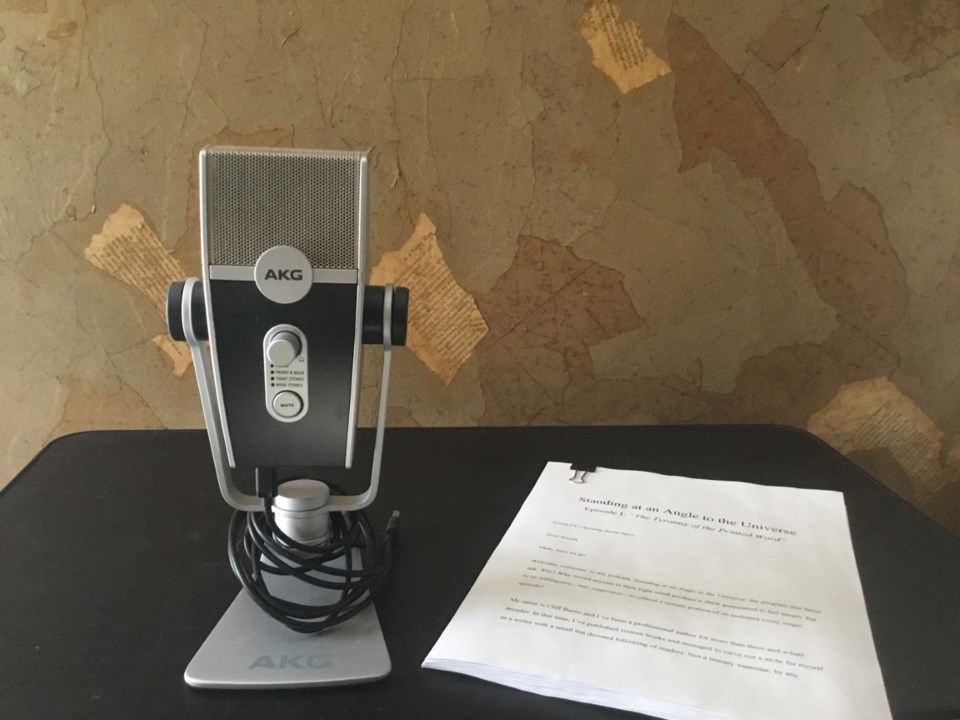MOOSOMIN — If you know Moosomin’s Kristjan Hebert and Evan Shout, you know these two guys have a lot of opinions, maybe even prone to the odd rant on a topic they especially feel passionate about.
Hebert and Shout have recently taken their wisdom in the world of all things agriculture to the online world, launching The Truth About Ag podcast a couple months ago.
During Canada’s Farm Show in Regina, the duo brought that show to the stage, recording an episode with Justine Hendricks, president and CEO of Farm Credit Canada as their special guest.
“I think I’m on the hot seat. I feel squeezed, gents,” joked Hendricks as the interview began.
“You forgot your ball cap,” replied Hebert as both hosts brandished such headwear, mostly to shield the stage lights.
This brief exchange, drawing laughs from the crowd assembled, set the tone for the casual chat; one that those watching couldn’t help but become enamoured with.
Shout began with clearing the air on a rumour that FCC intends to pull out of Saskatchewan, stating “I hear FCC’s moving to Ottawa.”
After briefly quipping that perhaps the head office could move to Moosomin, Hendricks removed any doubt of FCC pulling up stakes.
“We are not moving from Regina in terms of head office,” she confirmed. “We’ve been here since the ‘90s, there’s over 1,000 employees here, it makes a lot of sense for us to be headquartered here. But we also want to kind of maintain our footprint across Canada. So you two won’t get rid of me that fast!”
After providing a little background on how they met and shared ideals on the future of farming, Hebert was curious on Hendricks’ vision of that future from the FCC standpoint.
“My number one goal was to understand and get the vibe for what was going on,” said Hendricks, noting meeting with customers, employees and stakeholders was crucial in her first 15 months in the position.
“There’s two things that I heard loud and clear: one was, can you actually help tell the story,” she explained. “And then the other one was, FCC, we need you to do more. I heard that across the country.”
She referenced the tagline, ‘ag and food needs all of us,’ explaining how partnerships in and outside of the agriculture industry are vital.
“It starts with FCC, but really what that’s meant to say is we need to partner with those in the industry, those outside of the industry, and if we’re all going at it, hoping that we’re going solve it all, we’re going to lose before we even got started. If I was to take three words to summarize, what we’re trying to do is: we’re trying to be bold, we’re trying to be a catalyst, and we’re trying to be resilient.”
What is the story of ag today?
Shout put his co-host on the spot, asking Hebert what the story of agriculture in our province is today.
“There’s no question—I think agriculture is by far the best industry to be in, in the world,” Hebert replied. Providing clarity on that statement, he pointed to the simple fact that “the world needs food.” Hebert also noted the hundreds of thousands of jobs available that directly and indirectly revolve around agriculture, but also the strong connection to the land still present in younger generations.
“We’re still lucky enough in Canada that a lot of people are only one, two, three generations from the farm; that they still remember it, that we can capture that opportunity to bring them back,” he said, pointing to other parts of the world that are in some cases 10 generations removed from agriculture.
“The farm doesn’t mean anything to them, they still think bread comes from Sobey’s—not from wheat,” Hebert said. “I think in Canada, we have a huge opportunity there.”
He also stressed the importance of telling our story on the global scale, referencing a report released shortly before COP28 in Dubai that “literally showed virtually every commodity we grow in Saskatchewan, we are the best in the world.”
“Team Canada should be out there selling more commodities than we’ve ever sold in the entire lifetime of our nation,” Hebert said. “To build infrastructure, to build a rainy day fund for the future.”
Another part of the ‘telling our story’ piece is presenting information in a light that people will understand. For those outside the agriculture industry, words like ‘herbicide’, ‘pesticide’, and ‘genetically-modified’ may bring up negative connotations without the proper background.
“I have a million kids,”said Hebert via an analogy. “I feed them food, give them vitamins. If they’re sick, I give them a prescription, and at the end of the day, they’re healthy.”
A major point rising from the conversation was how the message 小蓝视频 put forward needs to be consistent—provincially and at the national level.
“If all the regions split up and then go elsewhere, it becomes super hard for you to sell who you want to be internationally,” said Hendricks. “So I agree, every province—and Saskatchewan has got so much to offer—but 40 per cent of the agricultural land is in this province. So within the province, you represent such a big part of what Canada is all about. But when we end up spending too much time, almost fighting with each other to have our own space, rather than saying, ‘can we put our foot forward together?’ That’s where I think you got to remember Team Canada and what it looks like internationally.”
The Truth About Ag podcast is available through all major streaming services.




